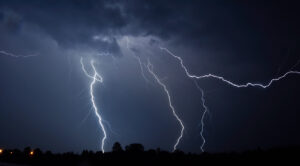
Thunderstorms can be scary, and there’s always the worry of a power surge or loss of power to our homes and business. Does this interrupt the effectiveness of our fire protection systems?
Thunderstorms are fascinating displays of nature’s power, combining lightning, thunder, heavy rainfall, and strong winds—and many areas in the Mid-Atlantic states experience them frequently. Unfortunately, thunderstorms can affect the operation of fire protection systems under the right conditions. It’s important to understand the risks and prepare for the worst-case scenario in case a thunderstorm does happen to strike.
Power Outages and Backup Systems
One of the primary challenges that thunderstorms present to fire protection systems is the risk of power outages. Lightning strikes can directly hit power lines, transformers, and other electrical infrastructure, causing disruptions in the power supply. Fire protection systems, including fire alarms, sprinkler systems, and smoke detectors, rely heavily on electricity to function and provide notifications. A power outage can render these systems inoperable, leaving properties vulnerable to fire hazards.
To mitigate this risk, backup power systems such as generators and uninterruptible power supplies (UPS) are essential components of fire protection strategies. These backup systems ensure that even if the primary power source is compromised during a thunderstorm, the fire protection systems will continue to operate, minimizing the potential for disaster.
Lightning and Sensitivity of Detection Systems
Lightning that accompanies thunderstorms can pose a direct threat to fire protection systems. Lightning strikes can induce power surges or create electromagnetic interference that affects the delicate electronic components of fire detection and alarm systems. Sensitive detection equipment like smoke detectors and heat sensors could malfunction or produce false alarms due to the sudden influx of electrical energy.
To address this challenge, fire protection systems are designed with surge protection and grounding measures. Surge protectors divert excessive electrical energy away from sensitive equipment, preventing damage. Additionally, proper grounding ensures that electrical charges are safely directed into the ground, reducing the risk of electrical interference.
Water Supply Interruptions
Thunderstorms often bring heavy rainfall, which might seem advantageous for fire protection. However, an excessive amount of rainwater can overload drainage systems, causing flooding and water supply interruptions. If fire sprinkler systems rely on local water sources, such as reservoirs or municipal water lines, flooding can disrupt the water supply or even contaminate it, rendering the sprinklers ineffective.
Fire protection systems should incorporate strategies to address water supply challenges during thunderstorms. This might involve designing backup water sources, such as dedicated storage tanks or alternative supply lines, to ensure a steady water flow for firefighting purposes, regardless of the weather conditions.
System Monitoring and Maintenance
Regular system monitoring and maintenance are vital to ensuring the reliability of fire protection systems, especially during thunderstorms. Harsh weather conditions can accelerate wear and tear on equipment, making them more susceptible to malfunctions. Wind, rain, and lightning strikes can compromise the physical integrity of components, and moisture infiltration could lead to corrosion and electrical faults.
Property owners and facility managers must prioritize routine inspections and maintenance procedures for fire protection systems. This includes testing backup power sources, inspecting wiring and circuitry for damage, and cleaning and servicing detection devices. Staying proactive with maintenance can help identify and rectify potential issues before they become critical during a thunderstorm event.
Fire Protection Services from Fireline
Whether you need smoke detectors, fire extinguishers, or an automatic sprinkler system installed at your commercial property, Fireline has you covered. We have been protecting people and property from fire damage since 1947—and our experience shows in our excellent work! We are known for our superb customer service, our expertise, and our reliability. For more information on how we can help your residential or commercial property, visit us online or give us a call at (800) 553-3405. We are in Baltimore, MD, with a second office in Leesburg, VA. For more fire safety tips, be sure to follow us on Facebook, Twitter, and LinkedIn.
This entry was posted on Friday, August 18th, 2023 at 2:37 pm. You can follow any responses to this entry through the RSS 2.0 feed. You can leave a response, or trackback from your own site.